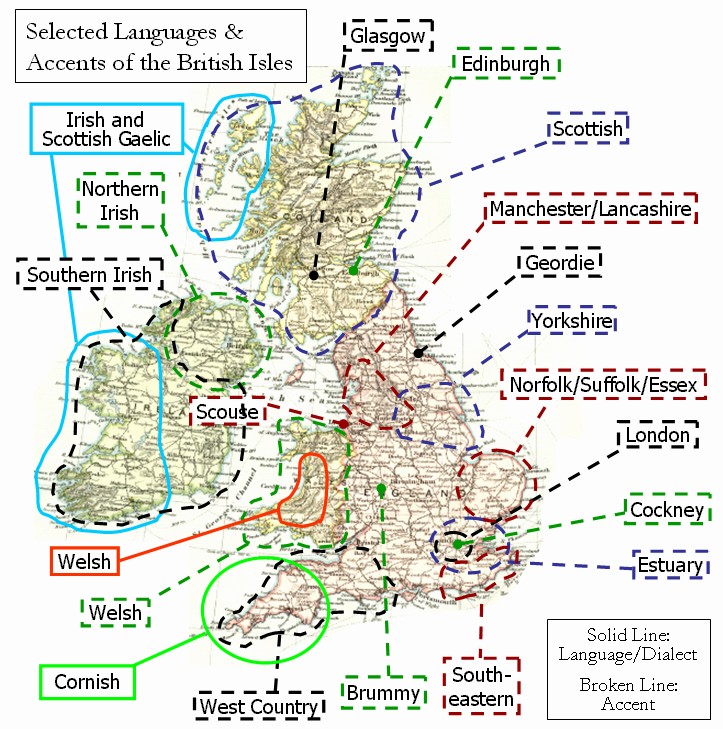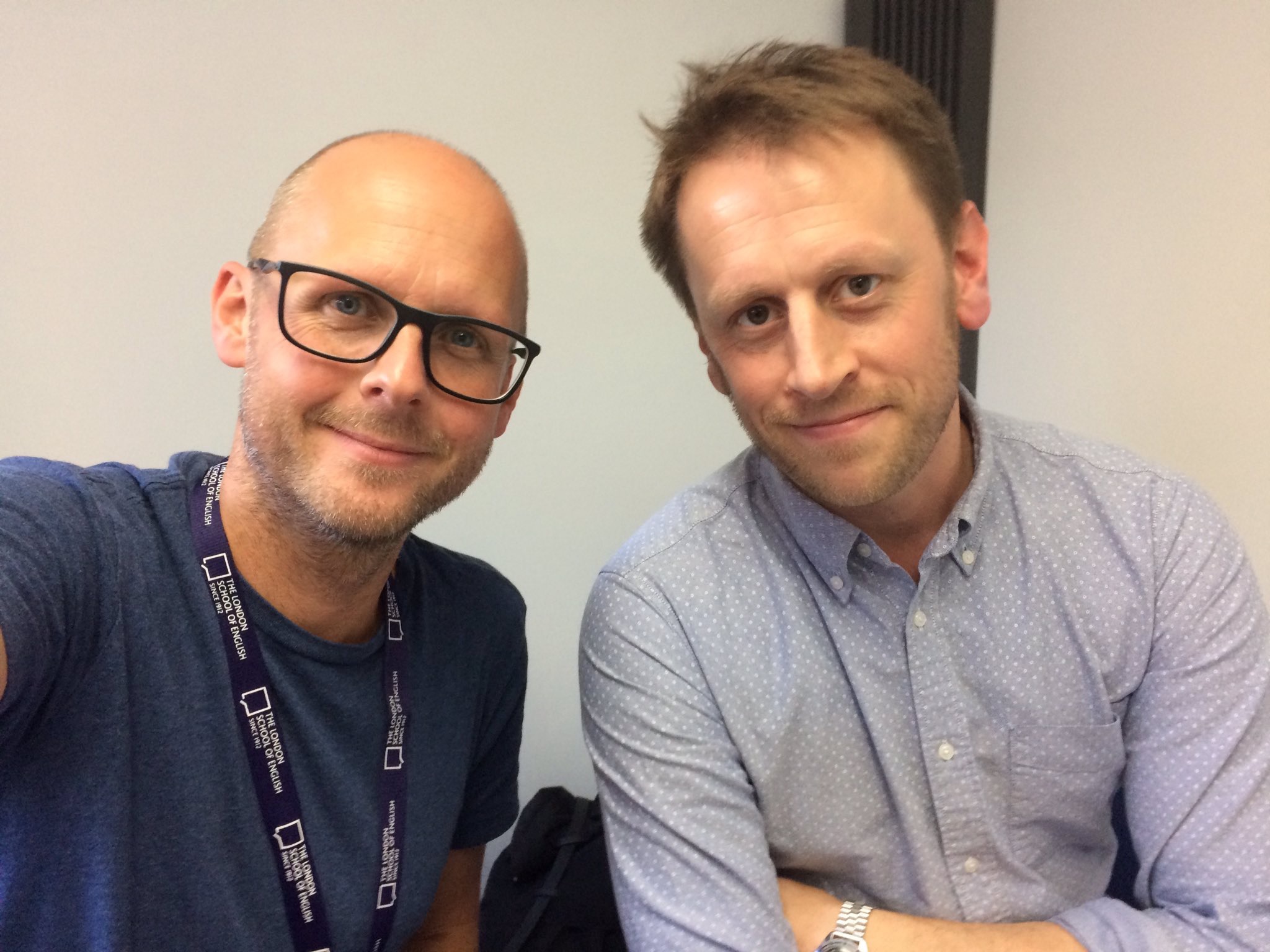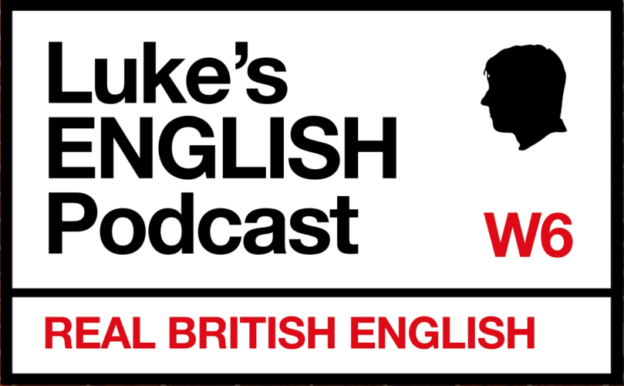This episode was originally recorded in February 2017 and is being uploaded in August 2017. In this episode I’m going to answer several questions from listeners about accents, including how regional accents occur in the UK and why there are so many accents there. Video available.
[DOWNLOAD]
Video
I’m not sick, I’m English, and it was winter. ;)

Introduction / Transcript
There is a very wide variety of accents in the UK (not to mention the accents you find in other English-speaking countries like Ireland, Canada, the USA, South Africa, Australia, New Zealand and more. English is a hugely diverse language and in my experience foreign learners of English don’t usually know a lot about the different accents – particularly all the regional varieties in the UK, and they often just find it difficult to understand them, and as a result learners of English can’t enjoy the great variety of sounds in English and the sheer diversity of character and personality you get from the different varieties of English, and therefore it’s worth talking about on the podcast.
This is such a big subject that to do it justice would require me to write a whole book about it. Instead I just do episodes about accents fairly regularly in an effort to cover as much of the topic as possible. For example, I recently did some episodes about British accents that you hear in the Lord of the Rings films, which gave me a chance to talk about the different associations we have with different accents in the UK and how those associations were used to provide some colour and character to the movie versions of Tolkein’s Lord of the Rings stories. I also did episodes about the accents you might hear in Glasgow and I spoke to Korean Billy about regional dialects and accents too.
Since uploading those episodes I’ve noticed a few comments from listeners wondering why there are so many accents in the UK, so I’ve prepared this episode which I hope will help you understand that a bit more.
The plan, in this episode (or episodes) is to talk about these things
- Why there are so many accents in the UK
- How our accents develop as part of a natural psychological process
- What this means for learners of English and teachers of English
Also, we’ll listen to someone speaking in a Liverpool accent and I’ll help you understand it
So, this episode is about the way people speak, but it’s also about history, psychology, how to learn English, what my friends sound like, and how to understand a football player from Liverpool.
How are all those things connected? Listen on and you’ll find out!
Why do we have so many accents in the UK? (Communication Accommodation Theory)
One of the things I said in those episodes about LOTR was that there is a really wide variety of accents in the UK, and that your accent reveals lots of things about you such as where in the country you’re from and what social background you come from.
Remember, when I say “Accent” this means simply the way that you pronounce the words you’re using.
If you remember, one of the things I mentioned in one of those episodes was a quote from George Bernard Shaw, which said “It is impossible for an Englishman to open his mouth without making some other Englishman hate or despise him”, George Bernard Shaw.
This gives the impression that we all hate each other of course, and I don’t agree. The point which is made by this quote is that we all have prejudices about each other’s accent and this is an expression of the class system probably. That middle class people probably look down on people with strong regional accents and resent people who speak with very posh accents and so on…
Here’s a comment from Nick in response to those episodes.
Nick 2 hours ago – [These bits in brackets are Luke’s comments]
What a complicated life there in the UK… Everybody resents each other because of their accents… [we don’t resent each other really, but we do judge each other a bit – we also love each others accents too] Wow I never thought that accents in the UK had such an important role in people’s lives. [Yes, they’re very important indicators of our identity – but they’re also a source of great fun, joy, amusement and celebration] Luke, thanks for this episode. You opened up the UK in a new way for me. Even though I knew about different accents in the UK (and from your podcast too) I somehow didn’t realize the deep meaning of accents in English life.
But I don’t really understand how it happened that you have so many accents in quite a small area. I can understand that different levels of society may have different words in their vocabulary, but why they should have SUCH different accents especially when they live in one city or region… maybe it was people’s desire to make something with the language, or at least with pronunciation in order to be somehow unique from others. Like different groups of people or subcultures dress in different clothes or different nations have their own folk costumes.
This is a really good question and there are so many interesting aspects to the answer. I’m now going to try and deal with that question.
Why do we have so many accents in the UK?
It could be explained by “Communication Accommodation Theory” or CAT for short.
Collins dictionary: “Accommodation” – countable noun
Accommodation is a kind of agreement between different people which enables them to exist together without trouble. (not a written agreement, but a social or psychological tendency to come closer to each other and form communities based on shared behaviour)
Communication Accommodation Theory suggests that the way we communicate is an expression of our desire or natural tendency to become part of a social group.
https://en.wikipedia.org/wiki/Communication_accommodation_theory (Wikipedia)
E.g. When I was living in Japan I picked up a lot of the body language because I wanted to fit in, basically. I didn’t even realise I was doing it.
That’s non-verbal communication, but we’re talking about verbal communication.
Also, it’s not just limited to individuals. Imagine whole communities of people, over many many generations being affected by this process.
https://scottthornbury.wordpress.com/2013/01/06/a-is-for-accommodation/ (Thornbury)
This could explain
- Why there are so many different accents associated with different regions in the UK
For example, why people in Liverpool speak differently to people in Manchester, or why the ‘cockney’ dialect came about (more on this kind of thing in a bit) - Why we naturally change the way we speak depending on the people around us
- Why speaking to a diverse range of people is very good for your accent
- Why native English speakers sometimes change the way they speak when talking to foreigners – e.g. when travelling or meeting a foreign person.
The tendency is to unconsciously adapt.
I’m going to try and deal with all these things, but not quite in that order!
Why native speakers sometimes adapt their language when talking to foreigners
According to Scott Thornbury (a well-known teacher and author of teaching materials and a bit of a legend in the world of English teaching) there are two versions – ‘caretaker talk’ and ‘foreigner talk’.
“This is especially obvious in the way we talk to children and non-native speakers, [using] forms of talk called ‘caretaker talk’ and ‘foreigner talk’, respectively. Both varieties are characterized by considerable simplification, although there are significant differences. Caretaker talk is often pitched higher and is slower than talk used with adults, but, while simpler, is nearly always grammatically well-formed. Foreigner talk, on the other hand, tolerates greater use of non-grammatical, pidgin-like forms, as in ‘me wait you here’, or ‘you like drink much, no?’”
I’ve seen this happening to some English teachers. They adapt their speech to the students, speaking this weird form of English that’s easy for foreigners to understand but might not be helping them learn.
It’s really difficult to judge it correctly as a teacher. How much do you grade your language, and how do you do it? It’s important to speak correctly – meaning in the sort of full English that you normally would use and in the same way that most native speakers talk to each other, while making sure it’s comprehensible. If you’re too ‘natural’ your students won’t understand you. But if you simplify your English too much, you end up doing this ‘foreigner talk’ which is just not a good model of the language.
I guess this is part of being a good teacher; knowing how to strike the balance between being comprehensible and yet also realistic and natural.
I always try to keep these things in mind when I speak. It’s probably why my voice becomes more and more like standard RP, which I think is just generally accepted to be clearest version of the language, and that’s how I was brought up to speak by my parents. That’s not to say other versions of the language aren’t correct of course, and as I’ve said many times before I love the different accents.
Do I accommodate when I talk to native speakers with different accents?
Yes I do – a bit – I mean, only to accents that are a part of me. I have a few slightly different accents in me and my speech slides in slightly different directions depending on who I am with. They’re not radical changes because I’m still being myself, but my speech does change a little bit. When I’m back in Birmingham my speech becomes a bit more Brummie. When I’m in London it does the same. Only a little bit of course. This is totally normal.
It’s also why it’s important to speak to other people on this podcast because it’s in the interaction with others that language really becomes most alive and natural. When I’m talking to you on my own I speak in my neutral voice, but when I’m in conversation with others you might hear my voice changing slightly. You might not notice to be honest because it’s a pretty mild change. Perhaps it doesn’t happen that much because I am still aware that I’m being listened to by my audience.
For example, when I spoke to Rob Ager from Liverpool about movies last year, my accent didn’t change that much. But maybe if I’d spent the weekend in Liverpool, just hanging out and talking, my accent might have changed a little bit.
When I lived in Japan I spent a lot of time working with people from Australia and apparently I picked up some of that accent – particularly the rising intonation pattern (my friends at home commented on it when I returned to England). So, the conclusion – I do accommodate a bit, but usually to an accent that I have personal history with, and only if I’m exposed to it for fairly long periods of time and when I’m feeling self-conscious it happens less.
Certainly when I’m back in Birmingham my accent changes a bit, because that’s where I spent a lot time when I was younger.
Cat’s question: What are Paul and Amber’s accents?
Amber & I are pretty similar. It’s just RP. Paul speaks RP too but with a bit more local influence. He’s from Kent so he speaks with some traces of a Kentish accent – e.g. glottal stops. “Native speaker” “Excited” Maybe some “th” sounds sound a bit like “d” or “v” sounds.
Some people seem to think that his voice is influenced by French. It isn’t.
That kind of influence would only happen if French was Paul’s first language, and he’d learned English as a second language in adulthood.
That’s not the case – in fact to an extent he learned both languages while growing up. He’s certainly native level in English, and he probably is native level in French too. He certainly sounds it. So, because he’s got, basically, two native level languages, they exist independently in his head and therefore don’t influence each other much in terms of accent. Every now and then it influences his vocabulary but he instantly recognises it and self-corrects. You might have heard him do it on the podcast sometimes.
Paul speaks very clearly, which is evident in the way people always tell him that they can understand what he’s saying. His English accent is influenced more by where he grew up in the south-east of England and by the wide variety of people he’s spoken to in his life. He spent many years travelling with Apple, studying and living in different parts of the UK. RP again is probably the default setting for someone like Paul, when trying to speak clearly, but those glottal stops and some dropped consonant sounds reveal that his most formative time for English was in Canterbury, and he is also not the sort of person to listen to a lot of BBC Radio 4.
Paul is also a natural mimic. He’s able to hold different accents in his head at the same time and switch between them. He’s something of a chameleon in that way. Put him in with a bunch of Scottish people for a long time and he’d probably emerge with traces of that accent I expect. Anyway, when he’s with Amber and me his accent is pretty much like ours but with traces of his Kentish background, which is why he says “Native speaker” like that.
So, that’s a bit about ‘accommodation theory’ in relation to my friends and me.
What about Nick’s original question about the diversity of accents in the UK? I’m going to talk more specifically about that in a moment.
But first let’s check out a funny example of a professional footballer from Liverpool who moved to France to play for Olympique de Marseille football club.
Now this is an example of an English person accommodating to French people around him, and we see that this is certainly not happening to Paul Taylor
Joey Barton’s weird French accent
An example of Communication Accommodation Theory in action.
Who is Joey Barton? What was the situation? (Barton is from Liverpool and usually has a Liverpool accent but in this video he is speaking to a room full of French journalists and so he unconsciously accommodates his English so it sounds French. It’s funny.)
Joey Barton speaking with this weird French voice
He was heavily criticised for this – a lot of people mocked him and called him stupid.
He’s definitely not stupid. Maybe he wasn’t aware of the different ways he could have changed his voice – e.g. speaking with RP probably just wasn’t something that would occur to him. This lad is a scouser through and through. He’s not going to start speaking RP – he’s going to accommodate to the French instead.
The reason he’s doing it, as explained by accommodation theory, is to make it easier for the French journalists to understand him. His Scouse accent is difficult for the French to understand. He was just trying to be intelligible and he ended up accommodating to their speech.
Also he did it to win social approval. I imagine being the only English guy there, in front of all those French journalists, with the pressure of playing for this big club and not speaking French, he wanted to win their approval.
This probably happens in Football quite a lot because of the emphasis on teamwork. I expect during training and while bantering with other players and staff, Barton had to very quickly adapt his speech to be part of the team. I imagine speaking Scouse English more clearly wouldn’t help the French.
(Joey Barton talks about the French accent incident)
It’s not just speech – it’s also non-verbal communication. Barton does a couple of typically French things, including the kind of ‘sigh’ or blowing of air through the lips which is really common (among French people).
According to research we are naturally wired to copy the speech and behavioural patterns of the people we’re talking to. It’s a natural, neurological process that humans engage in when they want to communicate, be understood and be accepted by others.
Significance for Learning English
For learning English this suggests some of the most important ways to improve your English pronunciation and your English in general are to
a) actually communicate with people in real conversations about real things
b) have the desire to understand others and really be understood by others
c) have the desire to share things (info) with the people you’re communicating with
d) have the desire to be socially accepted by the people you’re talking to.
So, spend time talking naturally with English speakers because you want to! Or at least, practise communicating in English not just because you think it’s important for your career or for your English, but because you are genuinely interested in sharing ideas, finding out about people and the world, and broadening the scope of your identity. The more motivated you are by these things, the more you’re opening yourself up to the natural neurological conditions for language learning.
Got it? Talking to different people with good English and who come from diverse origins about things you are interested in, really helps your English and your accent in particular!
Being engaged in genuine communication because you care about sharing ideas is going to help your brain in a natural process of language learning.
Other work helps too – like studying the phonemic chart, analysing the physical ways we pronounce different sounds, how speech is connected and all that stuff, and doing plenty and plenty of mechanical, physical practice. It’s important too, but certainly this theory suggests that our brains are wired to adapt our speech patterns in the right conditions as part of a social process.
But also, it may be vital for you to learn how to accommodate yourself to the English of the people you’re talking to. This from Scott Thornbury:
So, what are the implications for language teaching? In the interests both of intelligibility and establishing ‘comity’, Joey Barton’s adaptive accent strategy may be the way to go. For learners of English, whose interlocutors may not themselves be native speakers, this may mean learning to adapt to other non-native speaker accents. As Jenkins (2007: 238) argues, ‘in international communication, the ability to accommodate to interlocutors with other first languages than one’s own… is a far more important skill than the ability to imitate the English of a native speaker.’
So, when you’re chatting to other non-native speakers in English, how should you make yourself more intelligible in order to establish good relations? Do you suddenly start sounding like Luke Thompson, or do you accommodate to their way of speaking, following the rule of accommodation theory?
What do you think? Feel free to either agree with accommodation theory here, or disagree with it, but do give a good reason why.
But why are there so many accents in the UK?
It’s a really complex question which probably needs to be answered by someone with a PhD on the subject, but here’s my answer!
It’s probably a big mix of geography, culture, politics, history and human nature.
Tribalism
Perhaps it’s because we’re a small nation with quite a high population.
Geography
We’re an island (a group of islands actually) so that creates a clear land border – meaning that we’re a bit more ‘penned in’ than some other cultures.
The class system
RP was the standardised version, but ordinary folk spoke in their own way and weren’t expected to speak RP because they knew their place. They could never break away from that. We never had a revolution proclaiming everyone as equal, so working people didn’t take on the standard form of English.
Irregular spelling & pronunciation
The irregular relationship between the written word (spelling) and the spoken version means that the spoken version is perhaps more open to interpretation than others. Our written language is not phonetic, therefore the pronunciation is not tied down. There’s no solid rule book on how to pronounce English. There’s the phonetic chart, but that is based on RP and that’s where the class system comes into it. RP is associated with a certain class of people and then identity politics come into play.
Perhaps the multicultural ‘mongrel’ nature of the Brits has something to do with it. We’re a mongrel nation. Maybe the diversity of accents is the result of this patchwork or melting pot of different people and languages. E.g. Celtic, Nordic, Germanic, Norman French, Gallic French, Latin, Irish Celtic, Scots Celtic, Commonwealth nations like Jamaica, India & Pakistan – especially Jamaica which has had a massive influence the way young people in London speak, and now media, like American and Australian English that we hear on a daily basis.
Our islands have been visited, invaded, populated and influenced by migrating people and their voices for many many years. This goes deep into the past and continues to this day, even though the official version of history will suggest that we have one unbroken family line (The Royal Family that we all learn about in school). There’s a lot more diversity than this narrative would suggest. This could result in a wide variety of influences, creating diversity which is not obvious just by looking at people.
It’s also interesting to me that the narrative of the ‘unbroken line of history’ which we get from the monarchy, is also aligned with a certain way of speaking – this old-fashioned RP which is the standard form. Underneath that standard form, or next to it, there is a lot more variety and diversity.
There was a long period before the emergence of the single unifying monarchy in which the country was essentially split up into different, independent areas, ruled by competing monarchs. Tribalism was seriously important. Think: Game of Thrones. Community, loyalty, rejection of others – these were vitally important principles. It was the breeding ground for different local versions of a language. It must be the same in many other countries.
This relates to aspects of the accommodation theory.
Convergence is when people pull together in a community and naturally speak in the same way to express this shared identity. At the same time there is divergence – pulling away from other communities which could be rivals or whatever. If you’re part of one community you’ll speak like them and you won’t speak like the others. Either you’re in one or the other.
This could account for why people in Liverpool and Manchester speak differently even though the two cities are pretty close. Just look at the football fans to see how much of a rivalry there is between the two cities.
I expect a number of other factors have come together to cause the UK to have this wide diversity. But perhaps we’re just a lot more aware of the diversity because the place is really connected. It’s a pretty small island and we’re all squeezed in together with a clear natural border of the sea, and the industrial revolution happened there bringing the train – mass transport which suddenly brought everyone much closer together, making us a lot more aware of our different versions of English. I imagine if you examined other countries you would find similar differences in accent. The USA, for example, has definite differences, and it’s quite a young country in comparison. So, I expect many countries have similar diversity in accent and dialect. Perhaps we’re just a lot more aware of it in the UK.
We also have the class system which has added another dividing line – another factor which pushes communities together (convergence) or pushes them apart (divergence). Perhaps working class communities held onto their accents as a way of expressing their sense of local identity as a contrast to the less region-specific upper classes, who seemed to be less fixed geographically. E.g. The Royal Family has its own geography, which moves between international borders and not just across domestic community borders. I mean, Prince Phillip for example was born in Greece. The Queen’s ancestors were German. Despite the fact that they are the figureheads for the UK, they are not really fixed to local areas within the country.
This also would apply to the nobility – the proper upper classes, who probably owned land that perhaps their families hadn’t lived on for centuries. I expect one area of England for example was ruled by one family for a period, then another family became the rulers – either by conquest, trade, marriage etc. The ruling class probably were quite mobile. The people who lived and worked on the land, were of that land for generations.
So, working class people have stronger regional accents than upper class people. It’s absolutely nothing to do with so-called “lazy pronunciation”. It’s more to do with identity – strengthening local communities by having their own version of the language. Power, identity and economics.
No governing body to standardise English
Powerful people through their influence have guided the narrative that RP is the standard form – this also happens to be the English that the educated, wealthy class use.
So, that’s my fairly long and rambling answer, Nick.
We’re not finished with accents though. I’ve just talked about how C.A.T. might explain why we have so many accents in the UK, and also what the theory can tell us about things like my accent, the accents of my friends and also how you can work on your accent too. I still plan to spend some more time focusing on specific accents and playing around.
Now, I would like to ask all of you a few questions
- How many different accents can you identify in your country?
- Are accents in your country related to geography?
- Is there a standard accent? Is that accent associated with a particular region?
- What attitudes do people have about accents where you come from?
- In English, which accent do you prefer? If you don’t know a region, can you think of an individual person whose accent you like? Feel free to say Amber Minogue of course.
- If you’ve been shipwrecked and you get washed up on a remote island populated by a local tribe of native people who seem to use English as their main language and yet look like they might be hostile, or hungry, or both, what’s the best way to get into their good books? Speak like me, or speak like them? Or get back in the sea and swim?






















